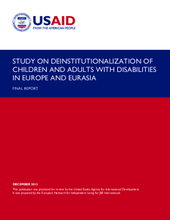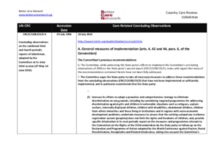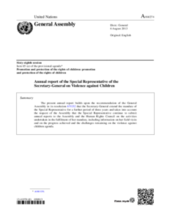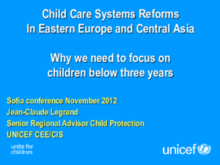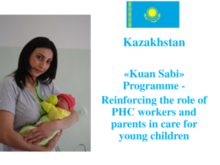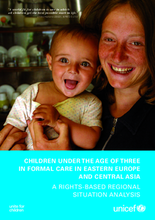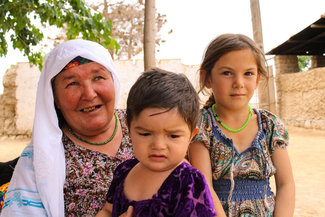

Displaying 71 - 80 of 114
This article provide one of the most comprehensive assessments of physical growth, biological markers of growth and nutrition, and general behavioral development, in this case conducted on 286 children under 3 years of age living in 10 institutions in Kazakhstan that were globally deficient.
This report from USAID, prepared by the European Network on Independent Living, features the findings from a study on why little progress has been made to end the institutionalization of people with disabilities in Eastern Europe and Eurasia.
This study compares the data on young people transitioning from out of home care from 9 non-communist European countries examined in the INTRAC document with 14 post-communist countries reviewed in the SOS and INTRAC publications.
This Country Care Review includes the care-related concluding observations on the third and fourth periodic reports of Uzbekistan, adopted by the Committee on the Rights of the Child at its sixty-third session (27 May–14 June 2013), as well as other care-related concluding observations, ratification dates, and links to the Universal Periodic Review and Hague Intercountry Adoption Country Profile.
In her annual report to the UN General Assembly, the Special Representative of the Secretary-General highlights the results of an expert consultation on violence in early childhood. The consultation highlighted the urgency of supporting families and caregivers in their child-rearing responsibilities and securing a responsive national child protection system to strengthen families’ capacity to raise young children in safe environments and prevent child abandonment and placement in residential care.
Oxford Policy Management has conducted two rounds of qualitative evaluations of three poverty-reduction and human development programmes run by the BOTA Foundation in Kazakhstan: the Conditional Cash Transfer (CCT) Programme, the Social Services Programme and the Tuition Assistance Programme. Each report produced by Oxford Policy Management includes a description of the methodology and results of the fieldwork as well as conclusions and recommendations.
Charts that accompany the article Orphan Fever: The Evangelical Movement’s Adoption Obsession, illustrating the trends in international adoptions from Liberia, Kyrgyzstan, Ethiopia, Uganda, and Haiti to families in the United States.
This presentation to the 2012 Sofia Conference by Jean-Claude Legrand, Senior Regional Advisor Child Protection, UNICEF CEE/CIS, highlights the situation of children in formal care, with particular concern for children with disabilities, and recommends reform and policy initiatives to improve the childcare systems in Eastern Europe and Central Asia.
This presentation to the 2012 Sofia Conference by the Kuan Sabi Program, in Kazakhstan suggests ways to improve the knowledge and skills of Primary Health Care workers that care for children under the age of 3.
Through a comprehensive statistical analysis and literature review, this UNICEF report provides a child rights-based up-to-date review of the situation of children under the age of three in formal care in the countries of Central and Eastern Europe and the Commonwealth of Independent States (CEECIS).

